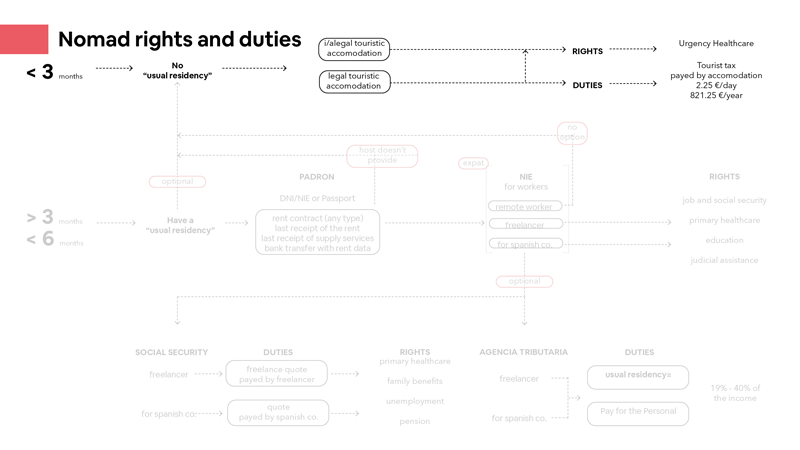INTRODUCTION
The aim of this project is to question the actual system of tourism and its future in a post-capitalistic world by making assumptions of what will happen in the next years. The challenge was to take the specific role of the Airbnb company proposed by the faculty in order to reconvert its failed business model after Covid 19. And to answer the main and most important question: How we can reconvert tourism in order to provide a beneficial layer to the city and its citizens?
A SERVICE FOR THE NEW NOMAD WORLD
By 2035, 1 billion people will be digital nomads. The nomads were the ones who were constantly travelling and looking for new resources as a community. And digital nomads today know where are the resources, but they look for the communities to be included in.
They choose location-independent and technology-enabled lifestyle that allows them to travel and work remotely. And thus, they regret owning any commodity. Their main characteristic is that they are constantly travelling for long periods of time, regardless destination.
As part of the Airbnb company, we believe that Digital Nomads will be the entrepeneurs of this nomadic lifestyle, and that every year the culture of nomadism will be adopted by more people. As deGen report on “The future of remote work” stablishes, 27% of the European workforce will be remotely in the future and Nomadism will be as common as any traditional lifestyle.
FUTURE ASSUMPTIONS
We believe that a new bacchanalia is coming to Barcelona (and the rest of the world) due to 3 primary assumptions: We will have fast & cheaper technologies, more mobile workers and less ownership trends in near future.
1. The wild growth of technology will increase the speed of our digital and physical connections
- Digital connectivity: The speed of Internet in 15 years will increase until 12.5 gigabytes per second and the 6G technology will arrive.
- Physical connectivity: New technologies as airplaines faster than the sound or the hyperloop will make us spend 75% less in our travels.
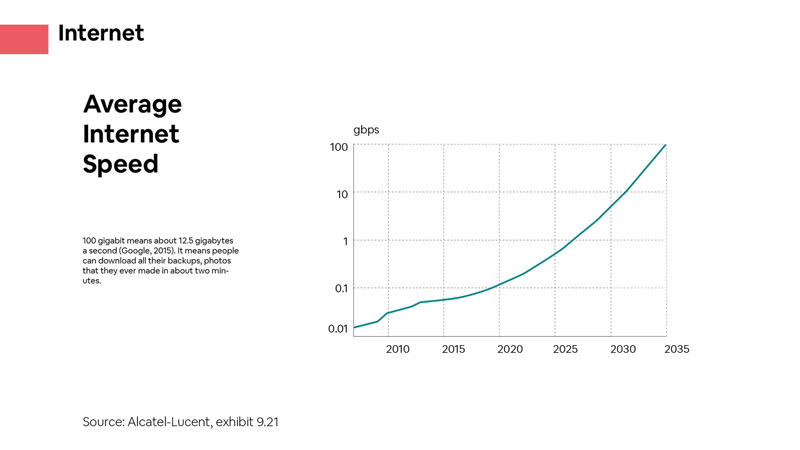
Future speed of digital and physical connectivity
2. Our perception of jobs is changing
- Work digitalization: Due to Covid, 84% of the companies have accelerated the digitalization of the work and 83% of the companies have provided more opportunity to work remotely.
- New marketplaces: During Covid19 crisis, people started to search for remote work opportunities, so the job market is adapted to the new trend. During the 4 months lockdown, the remotework marketplace has increased 26%
- Jobs Autiomation: In 5 years, due to the automation process and the rise of Artificial Intelligence, ninety-eight million jobs will be displaced, but we will have ninety-seven million new kinds.
- Hiring Adaptation: To adapt to the automation process, 70% companies think they will need to hire temporary staff, 45% of the companies will ire outsource businesses and 45% of the companies will hire freelancers.
- Shifting skill needs: Companies will also need to upskill and reskill their workers. As UNESCO explains, this process will be something that we will have to perform constantly in our lives, through lifelong learning. In the end, in this new mobile world, leisure, work and learning processes will be embedded.
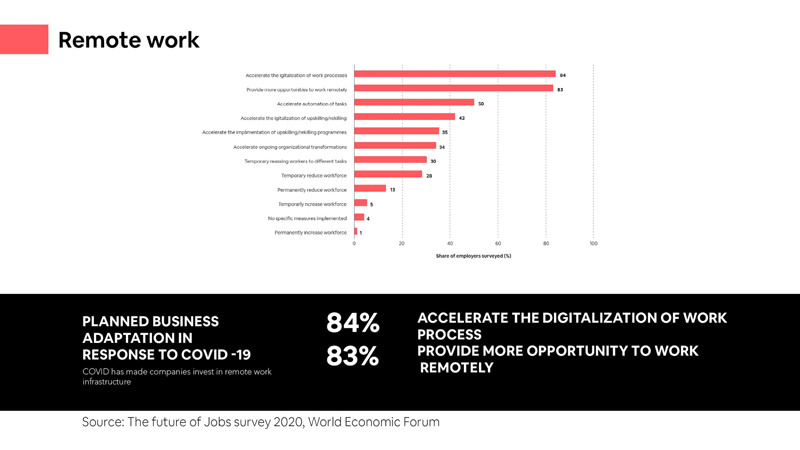
Future of jobs
3. Accesibility is becoming more powerful than ownership
- Ownership in decline: The housing market has always been the most solid one. But the tendency of ownership is in constant declining since 2010. By 2050, house ownership will decline by 15 points
- Sharing platforms growth: . It is estimated that, in 12 years, companies working in the sharing economies will increase by 2333% .
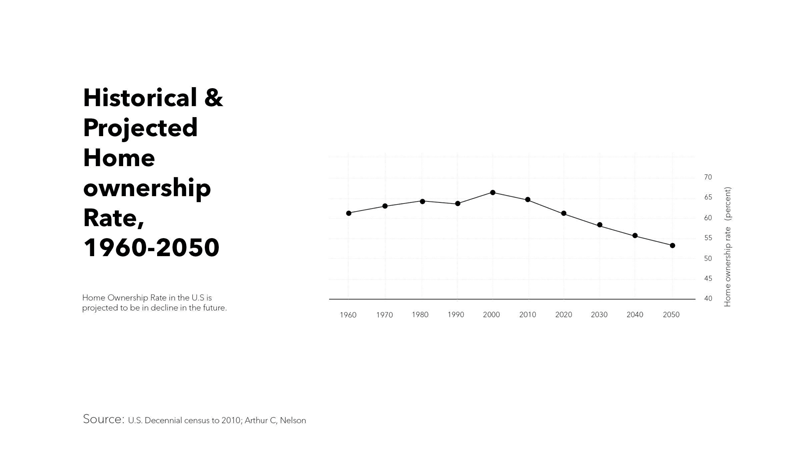
Ownership and sharing trends
AS AIRBNB, WHAT IS OUR ROLE?
Airbnb is a mediator between host and the guest and charges a fee to both of them as an intermediator, but the most important thing is that the company sells trust by using many tools: It provides transparency (by revies and photos on both sides), safety (by suspicious activity tracking and secure payments and 1st hand information (by providing information from locals).

Selling trust
The company has launched a lot of programs since it was created, not only short term rentals. One of the last ones, and not the only ones are the “Experiences” that are activities provided by hosts to increase sense of locality. In Barcelona (and many other cities) Airbnb has struggled due to the fact that it has been perceived as an enemy of the city, even if the dynamics of tourism itself is the one that creates the problems.

Airbnb timeline
The last year, due to Covid pandemic, tourism collapsed and the company lost 1.2 billion in nine months. We see this as an opportunity to rethink our business model and to adapt to the changing reality. Airbnb’s business can’t rely on only short term stays anymore, and our challenge is to improve the model itself.
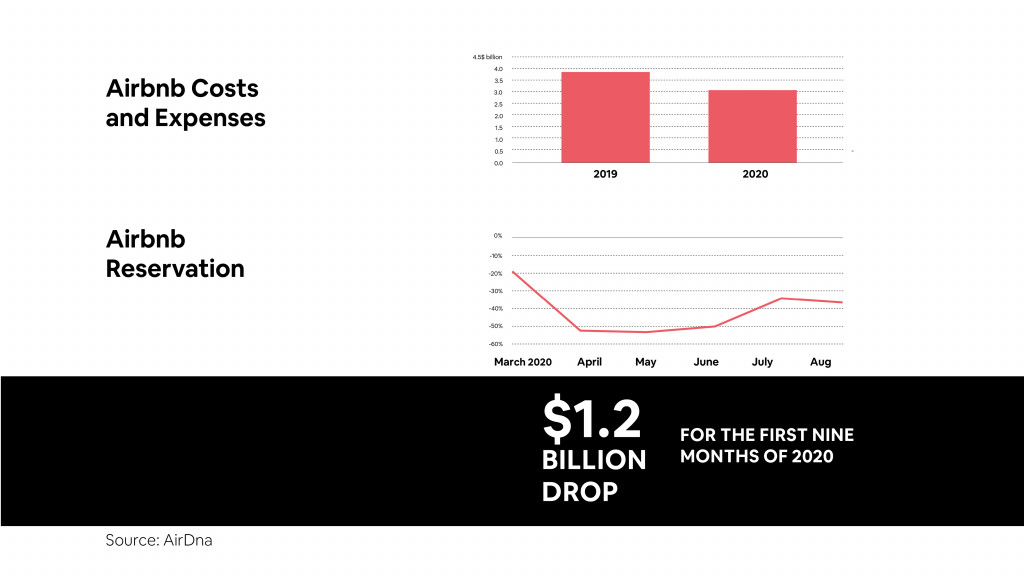
Airbnb loses during Covid19 pandemic
THE END OF TOURISM, AS WE KNOW IT: FIRST CHALLENGE
We believe the end of tourism, as we know it, is coming. As Airbnb we recognise that our system has not been adapted to accommodate for the needs of the grow?ng populat?on of nomads that is the midterm rentals.
1. “As digital nomads, we rent between 1 and 3 months and i there are no optios for that”
The statal and local regulations also contribute to this issue. The PEUAT (Strategic Touristic Plan of Barcelona) establishes that for homes, apartment and rooms that have touristic licenses they are only allowed to rent a place one month or less. The LAU (Spanish Urban Leasing law) only allows to have a home contract for one year or more but also contemplates the possibility of rescinding your house contract after 6 months. While in touristic accommodations, (such as hotels, hostels and so on) there is an opportunity to stay no matter its duration, for housing we have a void that doesn’t give you the possibility to have a home if your stay is from one to 6 months.

Statal and city regulation for accomodation depending on duration
- Airbnb listings from 2019 for entire homes offer depending on duration of stay: We analyzed he offer for stays less than 1 month, from 1 to 6 months, form 6 months to 1 year and for more than 1 year. And we estimated this offer comparing to the number of homes in each censal section of Barcelona. When it comes to short stays the concentration in Eixample and Ciutat Vella is evident. While in the other categories the are more spread.
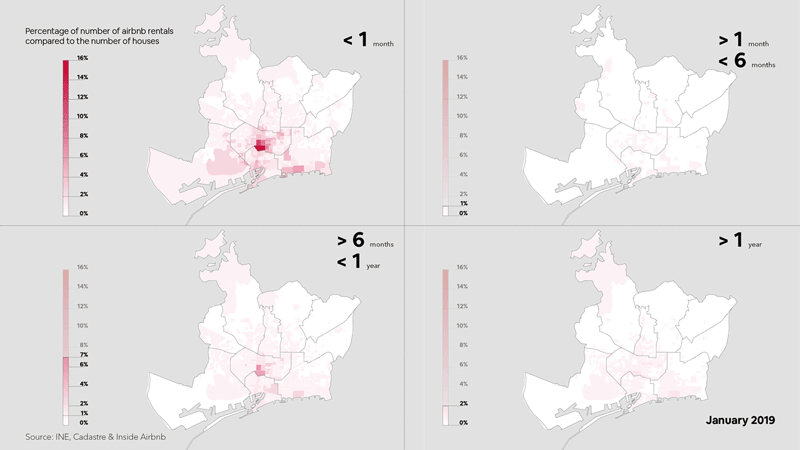
Source: Inside Airbnb. Entire homes Airbnb listings depending on duration of stay
- Airbnb listings from 2019 for rooms offer depending on duration of stay: We also analyzed offer by the number of listings for rooms in each censal section. In this case, The concentration in Ciutat Vella and Eixample is predominant but the difference between the categories is not so signinfcant. People is more willing to share homes for long periods of time.
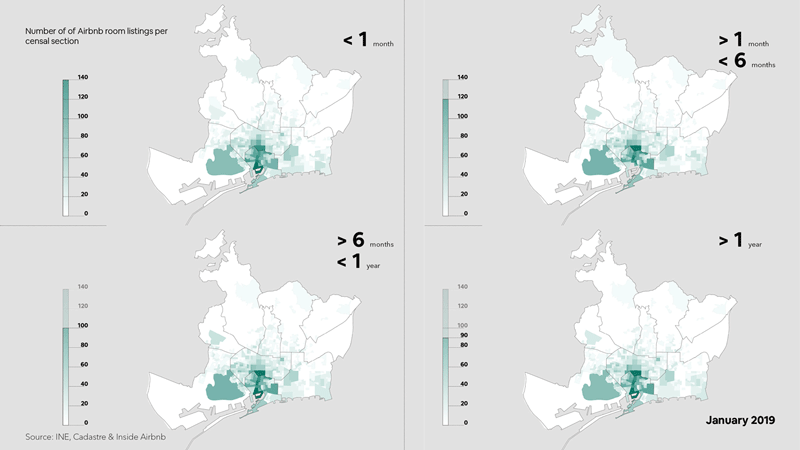
Source: Inside Airbnb. Rooms Airbnb listings depending on duration of stay
2. “Digital nomads are gaining reputation as tax evaders”
Another challenge is that digital nomads are gaining reputation as tax evaders. And this is because each country has its own regulation that makes the process harder for a person that changes of country every few months. In the case of spain depends on municipality registration. But the most important rule is the 183 days rule, that goes beyond the rest of them. You have only the duty to pay taxes in the country if you stay there more than half a year.
- Rights and duties depending on duration of stay: In Barcelona If you stay less than 3 months you cannot have an usual residency, there you don’t have acces to general rights and duties.When you stay from 3 to 6 months you have the option (but not obligation) to have rights and duties. You start the procedure by accessing an “usual residency” that gives you the address. This enables you to have a NIE, a Social Security Number and register in the tax agency. If you stay more than 6 months, then you have the duty to go through this process. Is an obligation, not a choice.
- Nomad Barriers: The first barrier for nomads is the complexity of the process. And that the process changes everytime you change of country. The second barrier is a time issue. Getting an appointment, providing different information and getting the permission to operate might take you at least two months in Barcelona. The last and most important problem is that for accessing to the process to have rights and duties, you have to proof that you have a usual residence to get the padron. Without an address, you dont have access to them. For that you need a legal contract of the house proving that you are staying there. But due to the accommodation laws mentioned before and the opposition from hosts to give access of the house contract to the guests (because the price of the rent appears in it) the usual residency proof becomes really hard to get.
WHAT DO WE WANT TO ACHIEVE?
We want to blurry the line between tourists and locals. We will be provid?ng short term (less than 1 month), midterm (between 1 to 12 months) and long term rentals (more than year) options. By introduc?ng the midterm rentals we are actually providing a service for nomads. We also think that Airbnb can be a platform that host all types of accommodat?ons for rent by creating a single market for accommodation, and this service will be accesible to everyone.
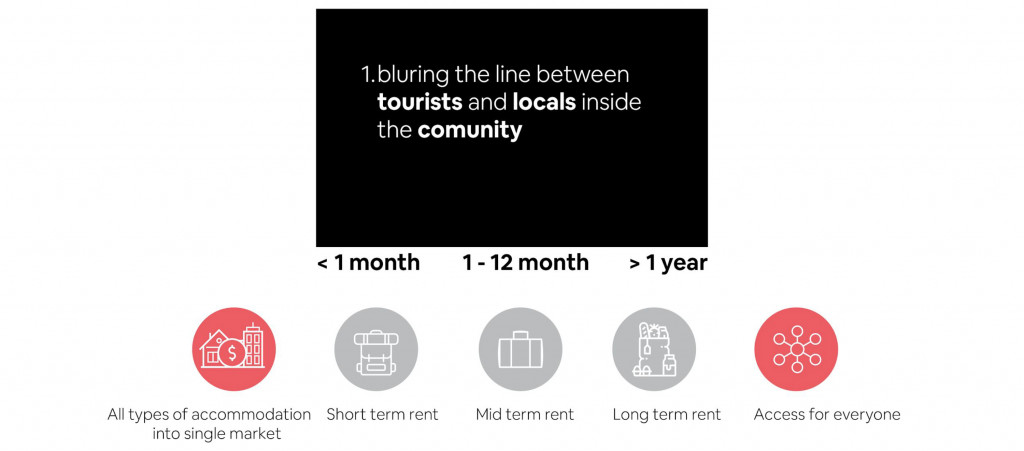
We will create a new service for the municipality in order to improve our relationship
We want to take advantage of the actual system and business model that we have created. But we will give a new service. Longtermers will provide the address that is so needed in the administrative process and the new stayers will provide the data needed for NIE, padron and other possible administrative processes.
Our platform will create and ID number for the new people joining the house. And this peoples data and ID will be provided to the municpality. In exchange, the municipality will give automatically a social security number, tax agency registration and NIE. We will provide this service to the municipality in exchange for the permission to operate of our whole platform, and the new stayers (longtermers or shortermes) will receive the rights and duties as residents immediately.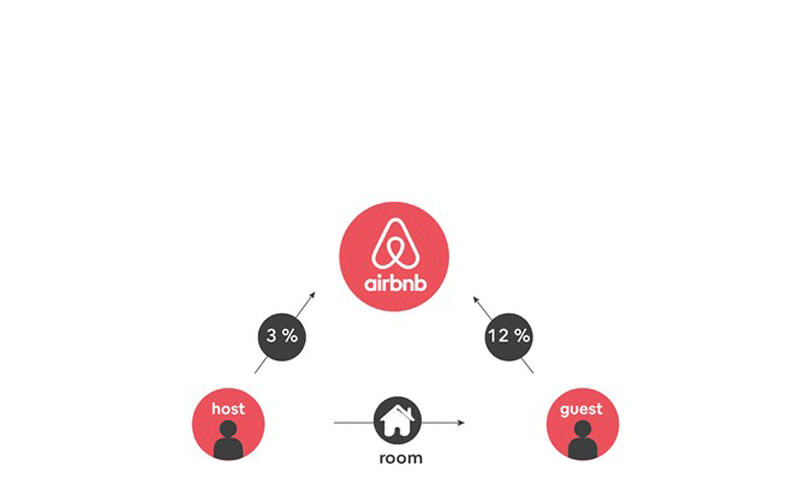
THE END OF TOURISM, AS WE KNOW IT: SECOND CHALLENGE
We want to redefine the profile of tourists and locals by elminiating them. No tourists or locals anymore.
1.”There is no interaction between tourists, as we know them, and so called locals.”
To analyze their pattern in the city, we used 3 years twitter data following these main steps.
- We concatenated 14 million tweets.
- We filtered them to eliminate twitter bots, that left us 3 hundred-twenty-thousand unique IDs and 11 Million tweets.
- Based on the first and last date of tweets by each unique id; we classify them as short, mid or long termers.
- Among all unique IDs, we had 70 percent short termers, where only 18 percent is mid-termers. Still, when we look at the number of total tweets by each profile, proportion of short termers doesn’t dominate the others. That allows us to make reliable observations on each profile.
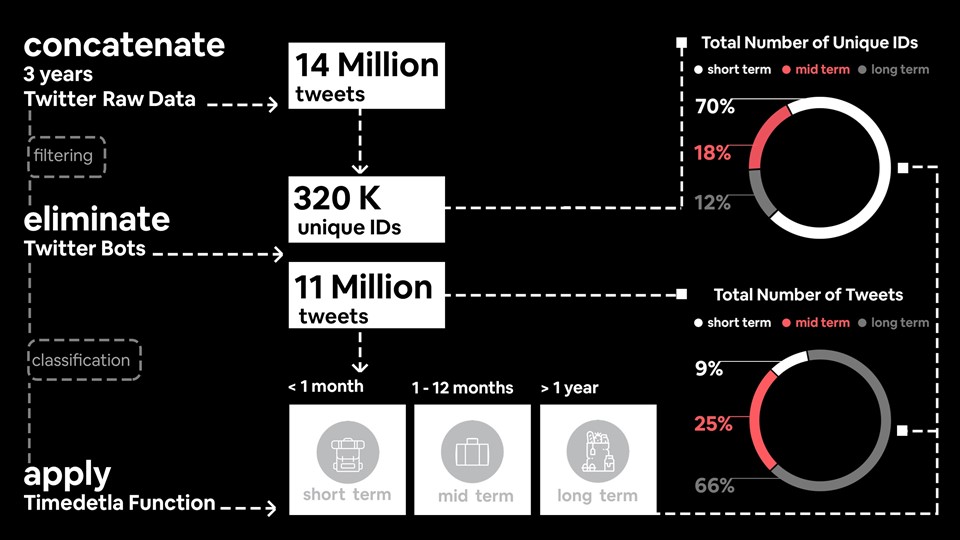
After filtering the data, we took only the geolocated tweets in 2019 to better follow their patterns in the city.
- Here we found that the short termers are focused in touristic hot spots. You can recognize them perfectly: Passatge de Gracia, La Ramblas, Sagrada Familia, Camp Nou and so on.
- For midterms, we still recognize the density in central locations but the presence of them becomes spread.
- For the long termers, which were so called the locals, they are more and more spread. Shows that the more they stay, the more they explore the city beyond the central touristic hotspots. Nevertheless, the center is center for all of the profiles.
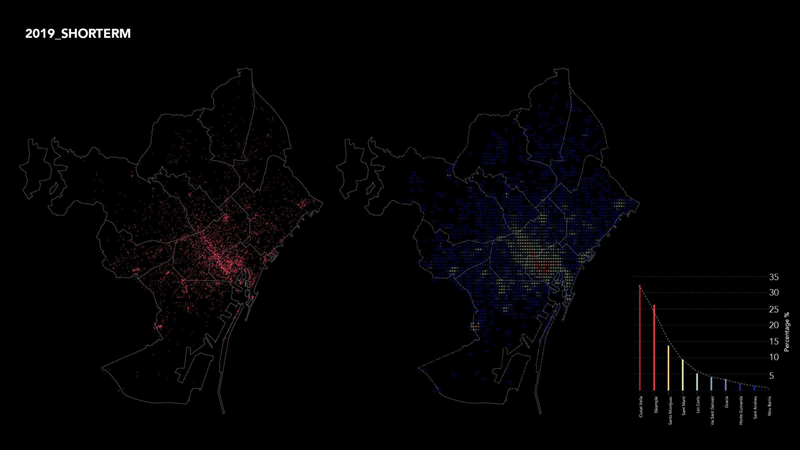
Source: Twitter. Geolocated twitter data for shortermers,midtermers and longermers
We also analysed the categories by their behavior at different times of the day
- Shortermers are more or less accumulated in the center and spreading in a uniform pattern throughout the day.
- The spreading pattern is similar in the case of midtermers as well.
- However, in the case of the longtermers we see a much more significant change in pattern of spreading throughout the day.
- In conclusion, midtermers tend to have a behaviour similar to shortermers and longtermers. They are in between them.
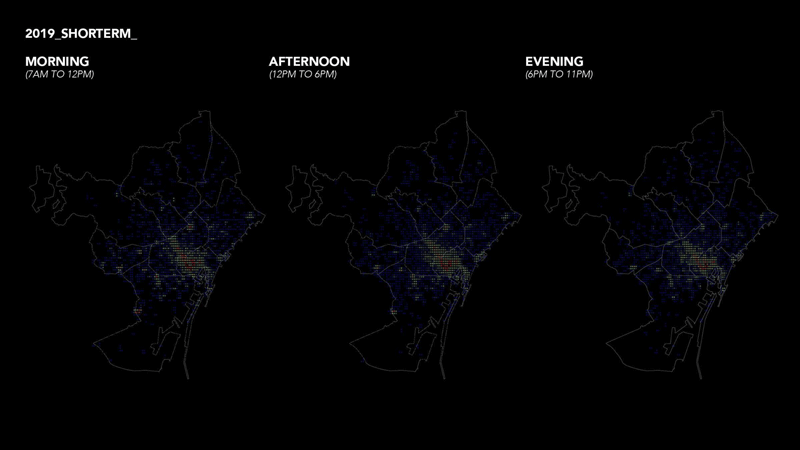
Source: Twitter. Geolocated twitter data for shortermers,midtermers and longermers depending on time of the day
WHAT DO WE WANT TO ACHIEVE?
We want to enable nomads and the community to benefit from each other. And in order to create a community, the people inside the community need to interact by spending time together. We propose they do that through leisure, learning and working.
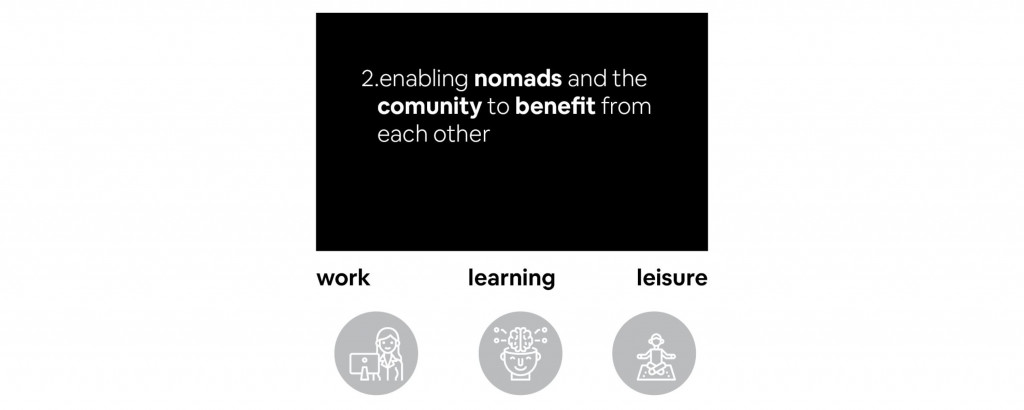
We are introducing communities in our listings and they are at the center, and these communities are what becomes the destination. The long termers, so called “hosts” provides houses to the community, and the community gives access to either long, mid or short termers to stay. And in return, every agent provides experiences to the community.
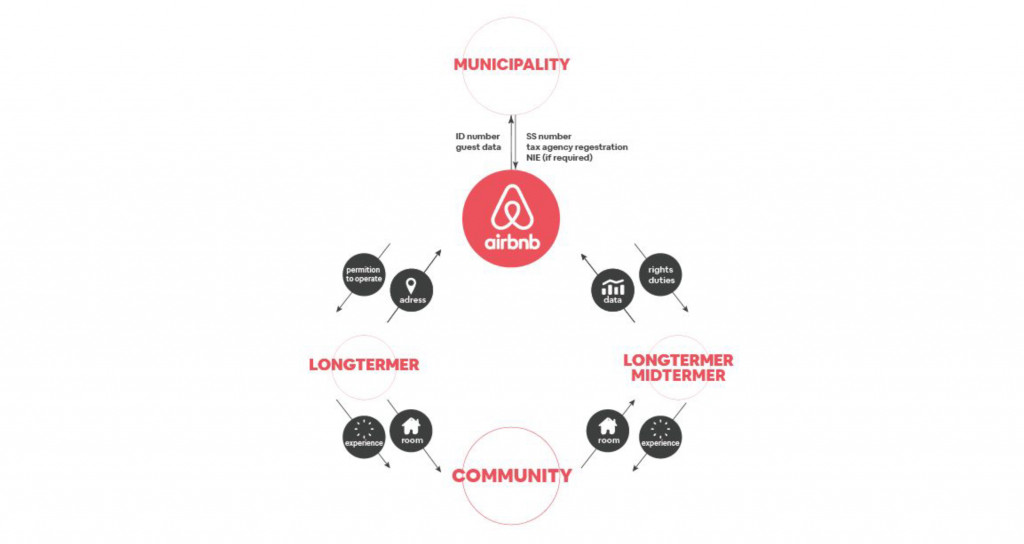
New service for global network
In order to create this network, we propose an app to enhance this work, leisure and learning relationships.
- So when nomads open the app they can create the profile and set filters that describe the person in a best way. These filters feed the algorithm to choose the proper community for them; here nomads also can put experiences they can provide for the community with rating.
- The next step for finding proper community is to set 3 main creterias that re price, duration which ia short mid long termer and purpose that is work leisure or learning.
- Once the community has been found they can choose if they want to live in shared and non-shared space. They also can see other profiles of nomads inside the community and the filters presented there, experiences and description qnd then they chose the accommodation itself.
- What the inviter can see in the interface is more or less the same but here it’s necessary to upload the pictures of the space and insert them inside the community profile..The algorithm makes the community constantly change that allows it to be dynamic and adaptable system.
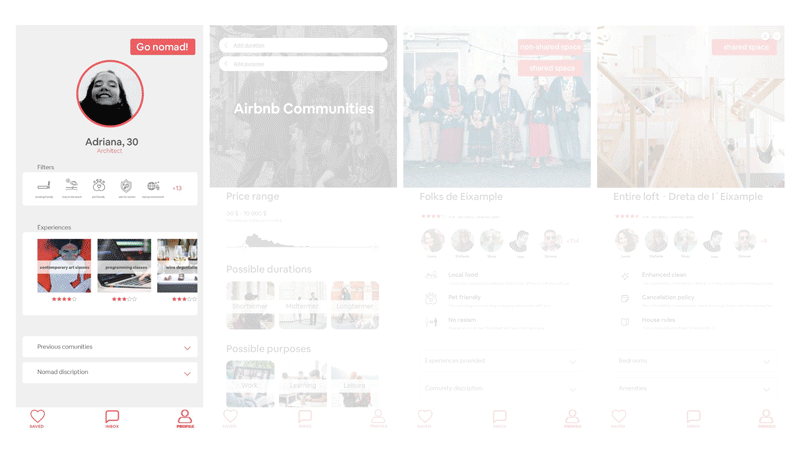
NEW NOMADS WILL BENEFIT THE CITY
1.Learning from the Olympics
We think that new nomads will benefit the city as it happened with the Olympics of Barcelona in 1992. To host all the amount of people in the city, a lot of money was invested but only 2% was payed by the municipality. Nevertheless 87% of the investment created infrastructure, housing and facilities that nowadays as citizens we use
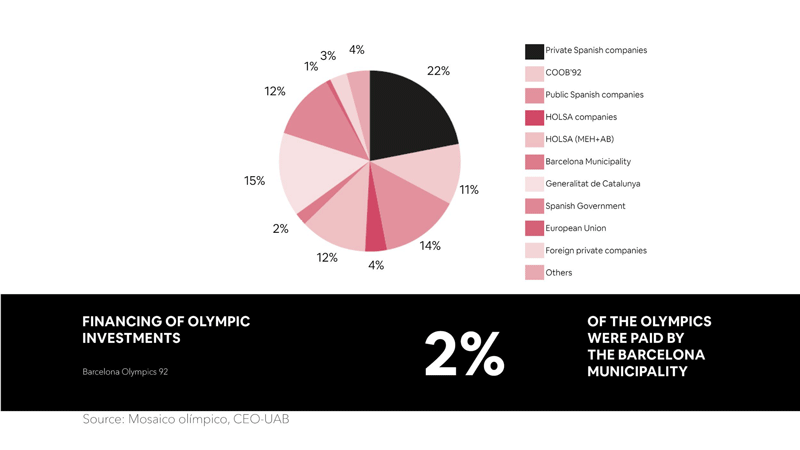
2.New nomads will bring a ‘no ownership culture’
This will create Cities based on sharing. Public and private companies will invest in Barcelona in order to create shareable infrastructure for transport, communications, resources and common and private spaces. That will be managed by sharing platforms that will grant access to everyone and will create co-owning dynamics. It will also mean the end of profesionalization because all people will become microoferents of the platforms.
And as citizens we will share everything, we will share goods, shared food (as producing food in community), shared mobility (that will bring fleats of shared sustainable cars, bicycles, drones ect. the whole infrastructure of companies as amazon will be shareable), shared resources (by processes of democratizing energy and sharing the excedences) and shared space (as cohousing, coliving and coworking spaces but also new types of land uses derived from new paradigms of the future).
This will be create strong communities through sharing enhanced by our platform where people will work, learn and enjoy together.
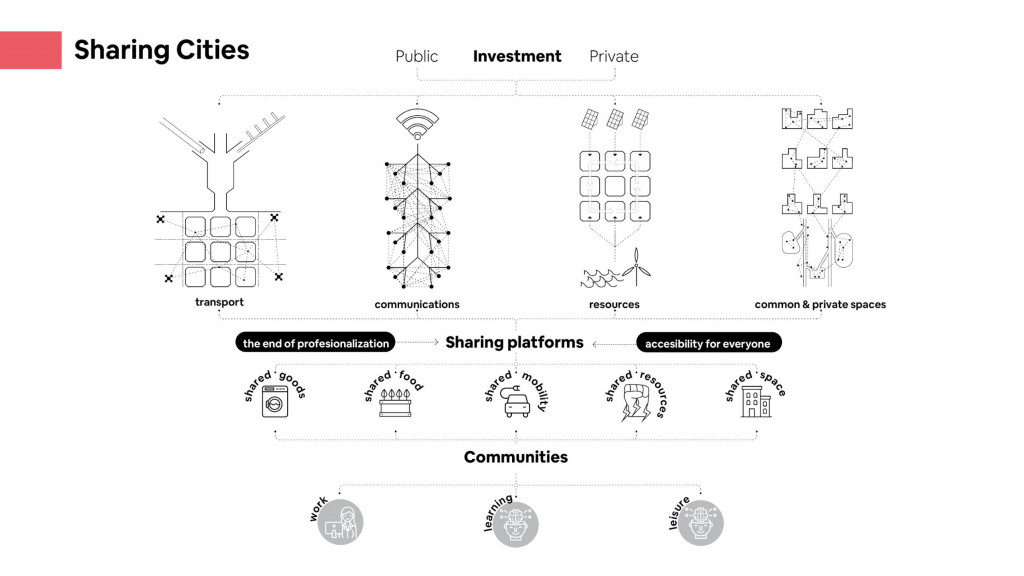
The future of no ownership cities
Welcome to the New Nomad world.
New Nomad World: The end of tourism as we know it is a project of IAAC, Institute for Advanced Architecture of Catalonia developed at Master in City & Technology in 2020/21 by students: Adriana Aguirre Such, Arina Novikova, Aishath Nadh Ha Naseer, Sinay Coskun and faculty: Luis Falcón & Iacopo Neri.
